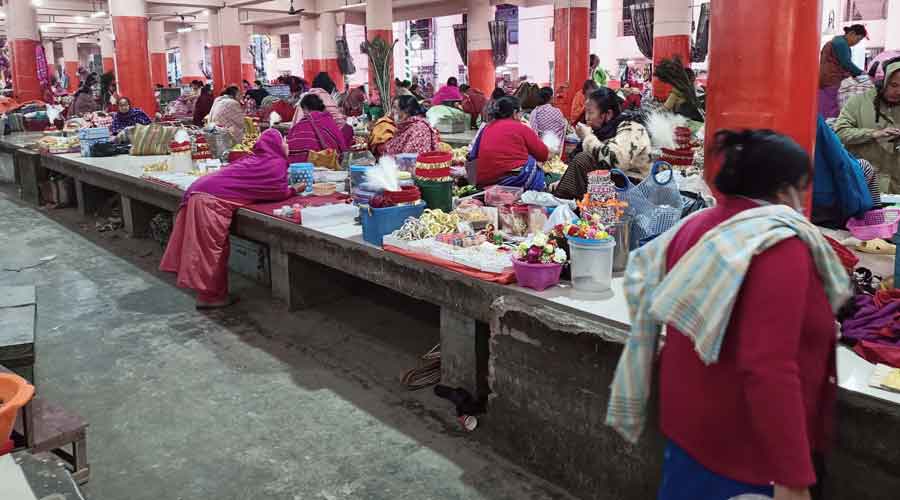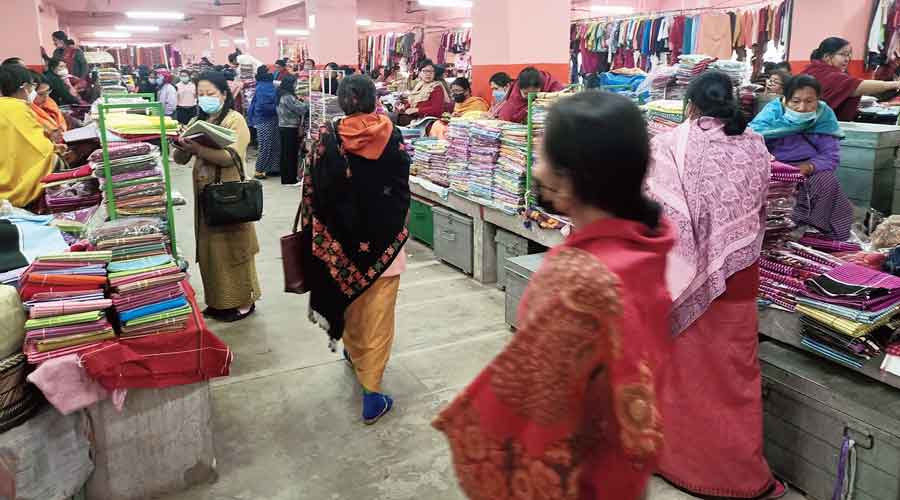The Ema Keithels or the “mother’s markets” in poll-bound Manipur may not be brimming with business but they are with promises.
The Ema Keithels are a symbol of women’s empowerment in the northeastern state and the “most influential political socialising agency”, because of which politicians of all hues are flagging the problems faced by the markets to reach out to Manipur’s wider women’s population. There are more women voters in Manipur than male voters and women have been traditionally influential in the state.
Asia’s largest and exclusively women-run and managed market in capital city Imphal is trying to limp back to life after a 17-month Covid-19-induced shutdown, but is battling an almost 50 per cent dip in sales over pre-pandemic figures.
Market committee president Thoudam Shanti and secretary Thingujam Rani told The Telegraph that the main Ema Keithel and the two others under their watch in the neighbourhood are witnessing a Covid-triggered downturn. They say footfall has increased but business is still cold because the pandemic’s fallout on the economy has affected both locals and tourists. The Ema Keithels are a tourist attraction as well but many visitors prefer to window-shop at the moment.
The market complex in Imphal, inaugurated by Congress president Sonia Gandhi in 2010, deals in an array of products — traditional attires, vegetables, dry fish, fruits, jewellery and handicraft, among others.

Ema Keithel in Imphal. Umanand Jaiswal
Election is understandably the last thing on the minds of the women at the Ema Keithel when this correspondent tried to engage with them on the two-phase Assembly elections scheduled for February 28 and March 5.
The BJP has been heading the state government with the National People’s Party (NPP) and the Naga People’s Front (NPF) since coming to power in 2017 after unseating the Congress after three straight terms.
Shanti and Rani, who have been in their respective posts since 2003, say the political parties (without naming any) are not serious about their problems and that they only received assurances from the administration during the shutdown. They say the NOTA (none of the above) “may not” be a bad option to exercise during voting.
“We were assured of financial help but not everyone received it. The municipal administration waived the Rs 100 monthly tax for two years. The authorities could have done more. The lockdown was tough. We lost 30 of our vendor-members during this period. Sales are now down by almost 50 per cent and the pandemic is still on,” Shanti says about the overall condition of the 500-year-old sprawling market that serves as a hub of trade, gathering and information.
Some vendors say the government had supplied “adequate” free ration to the needy during the pandemic.
But the markets, steeped in history and a vibrant symbol of women’s empowerment, have been hogging the limelight this fortnight since the ruling BJP and the Opposition Congress have made the Ema Kiethels a part of their election discourse.
The markets have their origin in the forced labour system (Lallup-Kaba) prevalent in 16th-century Manipur when men would be sent to distant places to till land and fight wars while the women took care of the household, worked in the field and sold the produce. This eventually led to the creation of the markets operated exclusively by women.
Congress general secretary Priyanka Gandhi Vadra flagged the pandemic-time woes of the Ema Kiethels during a virtual rally on February 15, promising to strengthen the management of the markets apart from announcing other schemes for women.
Congress leader Rahul Gandhi reiterated these during his first poll rally in Imphal on Monday, adding the party will build more Ema Kiethels. He also made an impromptu visit to the main Ema Kiethel in the capital, shook hands with vendors and took selfies with them.
A day later, Prime minister Narendra Modi followed suit. He said the BJP-led government had set up Ema Keithals in seven more districts, one of the many schemes to empower the state’s women. Chief minister N. Biren Singh is also drawing attention to the Ema Kiethels and women’s welfare issues during the campaign.
Women in Manipur are socially, economically and politically an influential lot. Businesses are mostly run by them and they are also at the forefront of protests. Most importantly, they outnumber male voters — 10,57,336 to 9,90,627 lakh — and turn out in large numbers on polling day. The Ema Kiethels are known for their collective reach and influence.
It is a different matter that women don’t have enough representation in the 60-member House. Of the 11 women candidates in 2017, only two won. This time, there are 17 women candidates out of the 265 nominees, with the BJP and the Congress nominating three women each, one more than in 2017.
Imphal-based social scientist Dhanabir Laishram, 68, told this newspaper that political parties are giving importance to the Ema Kiethels because they are the “most influential political socialising agency”.
“Senior members of the Ema Keithels across the state interact regularly with public leaders and share important developments at the grassroots and can influence voting. Through the vendors the parties are targeting the overall women population,” Laishram said.
Imphal-based human rights activist Babloo Loitongbam said focusing on the Ema Kiethels was “perception management”.
“They are creating a perception about developing infrastructure and promising women-centric schemes, something which would any day resonate with the women. This perception would help the parties become a talking point and help sway votes. Rahul Gandhi dropping by at the Ema market was a smart move, a part of this perception management. Given their social reach, these markets are now a market of votes — in a positive way. Therefore, everybody is trying to woo them,” Loitongbam said.
The Imphal market vendors hope the new government, irrespective of whichever party comes to power, will create more Ema markets in the districts so that the pressure on the capital city eases. The vendors have considerable influence in two constituencies of Imphal — Sagolband and Thangmeiband.
Overall, Manipur is set to witness a multi-cornered contest between the BJP, NPP, JDU and the Congress in most seats. The NPF and the NPP, though allies of the BJP in the government, are fighting the polls separately, something the parties acknowledge can result in a hung House.










